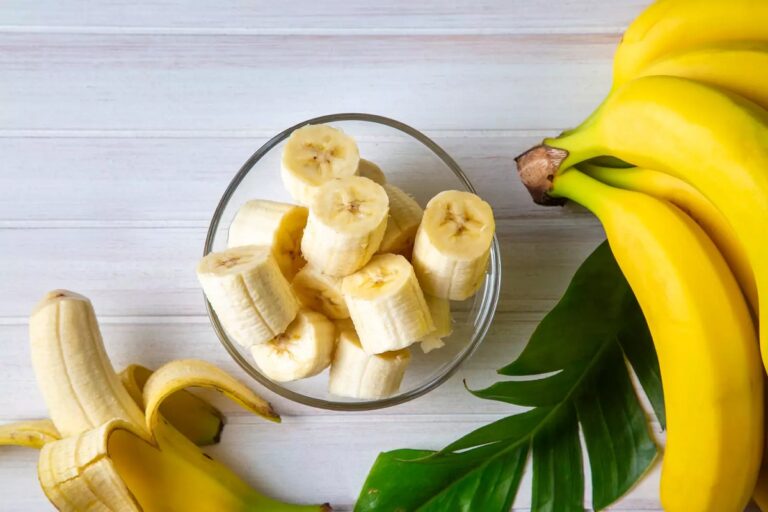Taking care of your kidneys is essential for overall health. These vital organs perform numerous functions, including filtering blood, eliminating waste, regulating blood pressure, and producing red blood cells. To keep your kidneys in top shape, incorporating specific kidney-friendly foods into your diet can make a significant difference. Here’s a guide to some of the best foods that help cleanse and detoxify your kidneys, supported by expert insights and real-life examples.
Bananas: A Sweet Defense Against Kidney Disease
Bananas are not just a tasty snack; they are also incredibly beneficial for kidney health. Rich in potassium, with about 360 mg per 100 grams, bananas help protect the kidneys by maintaining proper electrolyte balance. A 2019 study published in Medical Science Monitor found that higher dietary potassium intake is associated with a lower risk of developing chronic kidney disease. Additionally, research from 2005 highlighted that women who consumed two to three bananas weekly had a 33% reduced risk of kidney-related issues such as polycystic kidney disease and kidney stones.
Take Sarah, a friend who switched her afternoon snack to bananas. Not only did she enjoy the natural sweetness, but she also felt more energetic and noticed improvements in her overall kidney function. Including bananas in your daily diet can be a delicious way to support your kidneys.
Chives: Nature’s Purifier
Chives are more than just a flavorful addition to your meals; they possess powerful detoxifying properties that benefit the kidneys. In Traditional Chinese Medicine, chives are celebrated for their ability to cleanse the kidneys and enhance urinary function. Roberto Marrocchesi, a pharmacist and nutritionist, explains in his book Purify and Heal the Kidneys that chives help eliminate excess fluid and toxins from the body.
You can easily incorporate chives into your diet by sprinkling fresh or frozen chives on fish, meats, eggs, or sauces. Their mild onion-like flavor not only enhances your dishes but also provides your kidneys with the nutrients they need to function optimally.
Blackcurrants: A Powerful Diuretic
Blackcurrants are packed with vitamins and antioxidants, making them excellent for kidney health. High in potassium, calcium, vitamin C, and flavonoids, blackcurrants act as a natural diuretic, promoting the elimination of toxins and improving kidney function. Health experts recommend enjoying a glass of blackcurrant juice or two cups of blackcurrant berry infusion daily to reap these benefits.
However, it’s important to note that while blackcurrant juice is beneficial, blackcurrant leaf infusions should be avoided by individuals with kidney insufficiency due to their potent diuretic effects. Always consult with a healthcare provider before adding new supplements to your diet.
Dandelions: Nature’s Kidney Stone Fighter
Often regarded as a pesky weed, dandelions are actually a nutritional powerhouse for kidney health. Also known as field chicory, dandelions are rich in vitamins A, B, and C, as well as essential minerals like calcium, potassium, and magnesium. These nutrients are crucial for maintaining healthy kidneys and preventing the formation of kidney stones.
Marie-Laure André, a dietitian, highlights in her book 150 Healthy Foods that dandelions increase bile production and promote its evacuation, aiding both liver and kidney health. You can enjoy dandelion leaves in salads with a light vinaigrette or prepare dandelion root and leaf infusions for their detoxifying effects.
Fava Beans: Protein-Packed Kidney Support
Maintaining the right amount of protein intake is vital for kidney health, especially for those with existing kidney conditions. Fava beans are an excellent source of plant-based proteins, containing about 26 grams of protein per 100 grams. According to Professor Moglie Le Quintrec-Donnette from the University Hospital of Montpellier, it’s important to balance protein intake to avoid overburdening the kidneys.
Incorporating fava beans into your meals can provide the necessary protein without putting excessive strain on your kidneys. Try adding them to soups, stews, or salads for a nutritious boost that supports kidney function.
Fenugreek: An Aromatic Detoxifier
Fenugreek is a versatile herb known for its detoxifying and diuretic properties. Adding 1 to 3 grams of fenugreek powder to your daily diet can help eliminate substances that impair kidney function. According to the book Living Food for Your Health, germinated fenugreek is particularly effective in purifying both the liver and kidneys.
You can incorporate fenugreek into your cooking by sprinkling it on vegetables, mixing it into smoothies, or adding it to spice blends for a flavorful and health-boosting touch.
Mind Your Salt and Carbonated Drinks
While incorporating these kidney-friendly foods into your diet, it’s equally important to monitor your salt intake. Excessive salt consumption can harm the kidneys, so opt for fresh, unprocessed foods whenever possible. Enhance the flavor of your meals with herbs and spices like garlic, onions, thyme, basil, dill, curry, nutmeg, or lemon instead of relying on salt.
Staying hydrated is also crucial for kidney health. Aim to drink between 1 to 1.5 liters of water daily, spreading it out throughout the day. Be cautious with carbonated waters, as some can be high in sodium. Choose sparkling waters with less than 50 mg of sodium per liter, such as Perrier®, Salvetat®, or San Pellegrino®, to stay refreshed without overloading your kidneys.
Conclusion
Maintaining healthy kidneys is essential for overall well-being, and the right diet plays a pivotal role in achieving this. Incorporating foods like bananas, chives, blackcurrants, dandelions, fava beans, and fenugreek can help cleanse and detoxify your kidneys, supporting their vital functions. Additionally, mindful consumption of salt and selecting low-sodium beverages will further protect your kidneys from potential harm.
By making these simple dietary adjustments, you can enhance your kidney health and enjoy a more vibrant, active life. Always consult with a healthcare professional before making significant changes to your diet, especially if you have existing kidney conditions.






